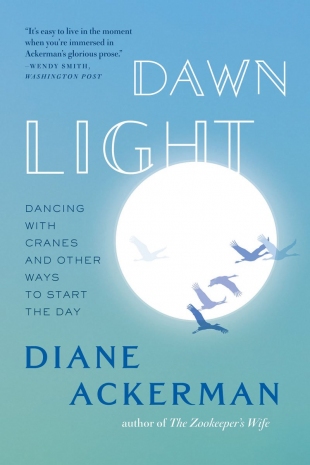"Whatever else it is, dawn is always a rebirth, a fresh start, even if familiar routines and worries charge in clamoring for attention. While waking, we veer between dreamy and lucid (from the Latin lux, light). Crossing that threshold each morning, we step across worlds, half a mind turned inward, the other half growing aware," writes Diane Ackerman, who coined the term "sense luscious" and illustrated what it means so persuasively in her bestseller A Natural History of the Senses. In Deep Play, she calls herself an "Earth Ecstatic" and that is an apt description considering the attention, empathy, and imagination she brings to her observations on nature, animals, and human behavior.
Her new book lives up to the high standards she's already achieved. To read it is to be transported into a wonderland of appreciative meditations organized around Spring (Palm Beach, Florida), Summer (Ithaca, New York), Autumn, and Winter. As usual, Ackerman's ambitious perspective dazzles the mind with its breadth, depth and sweep as she includes material here from science, world religions, art history, poetry, beekeeping, organic farming, etymology, and much more.
Here are some of the enchanting passages and subjects covered in Dawn Light:
• The 17 Japanese words for rain and a few of the 100 names for rain in Hawaii.
• The position of cranes in many cultures, including the Himalayan kingdom of Bhutan where they are honored as reincarnate beings.
• Why the World Health Organization labeled night-shift work a carcinogen.
• A celebration of the French painter Monet who was a lover of dawn light.
• Kumbh Mela in India when at dawn's light large crowds assemble and follow holy men down to Mother Ganga to bathe.
• Mockingbirds as "the cheerleaders of the morning" who awaken other birds by reminding them of their songs.
• A tribute to the late John O'Donohue, a poet, philosopher, theologian, ex-priest, and soul friend who adored awakenings and dawns.
• The rituals of dawn: cardinals are donning red robes, women applying red lipstick, and workmen planting red stop signs.
• Why duels are scheduled for dawn — so that antagonists might miss each other because they are still sleepy.
• The delight in the coming of the dawn described by tenth century Sei Shonagon, who wrote Pillow Book.
• The Druid belief that wrens are the king of birds associated with divination.
• From Rumi: "The breeze at dawn has secrets to tell you. / Don't go back to sleep."
• Dawn as the favorite time of day for hot-air balloonists, soloing student pilots, and surfers.
Ackerman gathers marvels and shares them with us. We come to a fresh gratitude for the diversity of creation and all the marvelous possibilities wrapped up in dawn. When you finish reading this book, you'll want to reflect upon all the things you have learned and, even better, opened your heart to as you have wandered through these pages.
